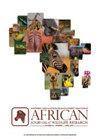在多尺度上评估欧比羚羊种群的表现:公民主导的欧比羚羊保护的局限性
IF 1
4区 环境科学与生态学
Q2 Agricultural and Biological Sciences
引用次数: 1
摘要
有效的监测方案对于了解和减少野生动物数量的减少至关重要。在南非,大多数奥里比羚羊(Ourebia ourebi ourebi)分布广泛,种群高度分散,分布在私人牧场上。因此,为了有效管理这样一个物种,保护组织依赖于公民科学领导的保护举措,通过该举措,公众提供有关奥里比种群人口统计和潜在威胁的数据。利用这些数据,我们估计了奥里比人的总人口规模,并评估了南非夸祖鲁-纳塔尔州奥里比人在14年期间(2001-2004年)的人口趋势。我们发现奥里比人的数量在14年里下降了30%。然而,奥里比人的估计数与返回的调查表格的数量高度相关。这种关系使得准确评估种群趋势变得困难,几乎不可能确定保护管理的任何变化是否影响了奥里比种群。因此,与公民科学和数据质量(即参与水平)相关的问题可能会限制奥里比人口普查准确告知奥里比保护和管理的能力。我们讨论了公民科学在奥里比保护中的价值和局限性,最终目标是改善公民主导的奥里比保护。本文章由计算机程序翻译,如有差异,请以英文原文为准。
Assessing the Performance of Oribi Antelope Populations at Multiple Scales: The Limitations of Citizen-Led Oribi Conservation
Effective monitoring programmes are critical to understand and mitigate declining wildlife populations. In South Africa, the majority of oribi antelope (Ourebia ourebi ourebi ) occur on private rangelands as broadly distributed and highly-fragmented populations. Thus, to effectively manage such a species, conservation organizations rely on citizen science-led conservation initiatives, whereby members of the public provide data on oribi population demographics and potential threats. Using these data, we estimated the total oribi population size and assessed the population trend of oribi in KwaZulu-Natal, South Africa, over a 14-year period (2001–2014). We found that the oribi population has declined by 30% over the 14 years. However, oribi population estimates were highly correlated with the number of returned survey forms. This relationship makes it difficult to accurately assess population trends and almost impossible to determine if any changes in conservation management have influenced oribi populations. Thus, issues associated with citizen science and data quality (i.e. participation levels), may limit the ability of the oribi census to accurately inform oribi conservation and management. We discuss the value and limitations of citizen science in oribi conservation with the ultimate goal of improving citizen-led oribi conservation.
求助全文
通过发布文献求助,成功后即可免费获取论文全文。
去求助
来源期刊

African Journal of Wildlife Research
Multiple-
自引率
0.00%
发文量
14
期刊介绍:
The African Journal of Wildlife Research is an ISI ranked, leading peer reviewed scientific publication in wildlife research in Africa, Arabia and Madagascar, with a broad base covering scientific, applied, managerial, methodological and sociological issues related to wildlife research. The journal publishes original full-length scientific papers, short communications, book reviews as well as reviews on science-based research invited by the editor-in-chief. This research journal and has been published annually since 1971.
Until 2014 (Volume 44) the journal was known as the South African Journal of Wildlife Research and from 2015 (volume 45) the name changed to African Journal of Wildlife Research. The journal reaches a wide readership, including both local and foreign wildlife managers, academics and wildlife owners, and libraries local and abroad. It is an important reference for anyone interested in the management and sustainable utilisation of natural resources.
 求助内容:
求助内容: 应助结果提醒方式:
应助结果提醒方式:


